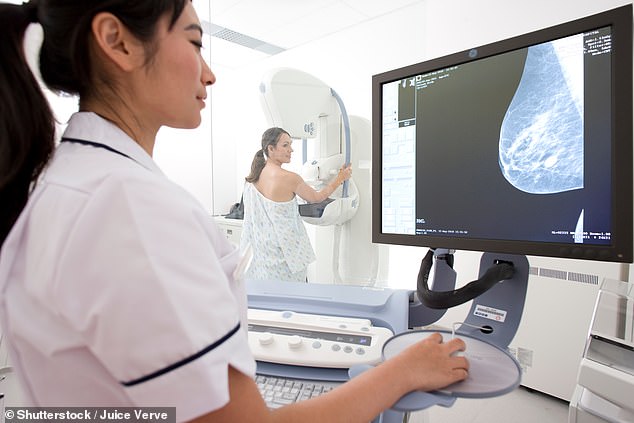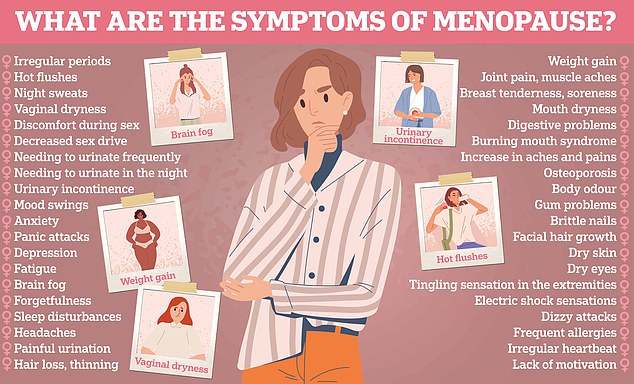Women who experience early menopause may be at higher risk of cancer, a study suggests.
British researchers have discovered a set of genes that, if women have a defective copy, can trigger the change five years earlier than average.
They also found that some genes that can increase a woman’s risk of breast cancer by up to six times could also cause the change to happen earlier.
This includes the BRCA1 gene mutation made famous by actress Angelina Jolie, who underwent a preventative double mastectomy after testing positive for the condition in 2013.
Experts from the universities of Exeter and Cambridge made their discovery after analysing genetic data from more than 100,000 Britons.
Actress Naomi Watts, 55, best known for her roles in Mulholland Drive and Peter Jackson’s King Kong, is one of the most famous faces to speak out about going through early menopause, experiencing the change at just 36 years old. Watts is pictured at the premiere of ‘The Friend’ during the 2024 Toronto International Film Festival earlier this month.
They found a set of genes that cause a woman’s eggs to deteriorate more quickly.
Women are born with a finite number of eggs and when this supply is depleted it can trigger the hormonal changes that lead to menopause.
For most British women, this happens between the ages of 45 and 55, but for about one in 20, it can happen earlier.
The new study, published in the journal Naturesuggests that in some cases a woman’s genes cause her to run out of eggs more quickly, triggering early menopause.
Women with a defective copy of a gene called ZNF518A had the largest observed reduction in age at menopause, experiencing the change on average five and a half years earlier than those with a normal copy.
This ZNF518A variant was found to occur in only one in 4,000 women in the UK sample size.
Another aspect of the study looked at whether genes linked to increased risk of breast and ovarian cancer also influenced the timing of menopause.
Experts have found that the BRCA1 gene, which increases a woman’s chances of developing breast cancer by up to 85 percent, reduces the average age of menopause by 2.1 years.

Experts also discovered that the BRCA1 gene mutation, made famous by actress Angelina Jolie, who underwent a preventative double mastectomy after testing positive in 2013, could cause women to experience menopause about two years earlier than normal. Jolie is pictured at the premiere of “Without Blood” at the Toronto International Film Festival earlier this month.

Women with the faulty BRCA1 gene mutation have a lifetime risk of breast cancer of up to 85 percent – about six times higher than the average risk of the disease for all British women of about 14 percent. File image
Another gene, BRCA2, which increases a woman’s chances of developing breast cancer by up to 77 percent, was found to reduce the average age of menopause by 1.2 years.
To put this into context, British women, on average, have only a 14 per cent (about one in seven) risk of developing breast cancer in their lifetime.
The experts also discovered that another gene linked to the timing of menopause, called SAMHD1, also influences cancer risk.
Unlike other genes analyzed, changes in this one were found to increase the average age of menopause by one year.
But it has also been found to increase the risk of cancer of all types in women by up to 60 percent, particularly breast cancer.
And another part of the analysis found that changes in this gene in men increased the odds of developing cancer by more than 100 percent, particularly prostate cancer.
The authors said exploring the genetic factors that influenced menopause expanded knowledge of both the biological factors underpinning the change and its possible links to other diseases.
They added that finding ways to influence these genes could improve outcomes such as increasing women’s fertility.
Professor Anna Murray, from Exeter and one of the lead authors, said: ‘For decades the menopause has been under-researched, but it is now a rapidly evolving area of science.
‘The timing of menopause has a huge impact on women when planning their careers and lives, and understanding the genetic changes is of particular interest in terms of potential treatments that could prolong reproductive life in the future.’
Premature menopause is generally rare: only 5 percent of women experience it.
Actress Naomi Watts, 55, best known for her films Mulholland Drive and Peter Jackson’s King Kong, is one of the most famous faces to speak out about going through early menopause, experiencing the change at just 36 years old.

She has since launched her own line of menopause products, Stripes, to “address the skin and body changes of menopause.”
Signs of early menopause include having irregular menstrual cycles for a few years, spotting between periods, and changes in vaginal bleeding.
Early menopause has previously been linked to health problems.
This condition is known to increase the risk of osteoporosis (weak bones), heart disease, depression, dementia and Parkinson’s. People who suffer from it also tend to experience menopausal symptoms more severely.
Premature menopause can be caused by chromosomal abnormalities, an autoimmune disease or infection, or a side effect of cancer treatments.
But in 90 percent of cases the cause of early menopause is unknown.
Women who begin menopause earlier than expected are often offered hormone therapy to replace the hormones that are normally produced. Doctors recommend that patients take it at least until the average age of menopause.
Early menopause is different from premature menopause, which is the term used when a woman’s periods stop before age 40. This only affects about 1 percent of women.


